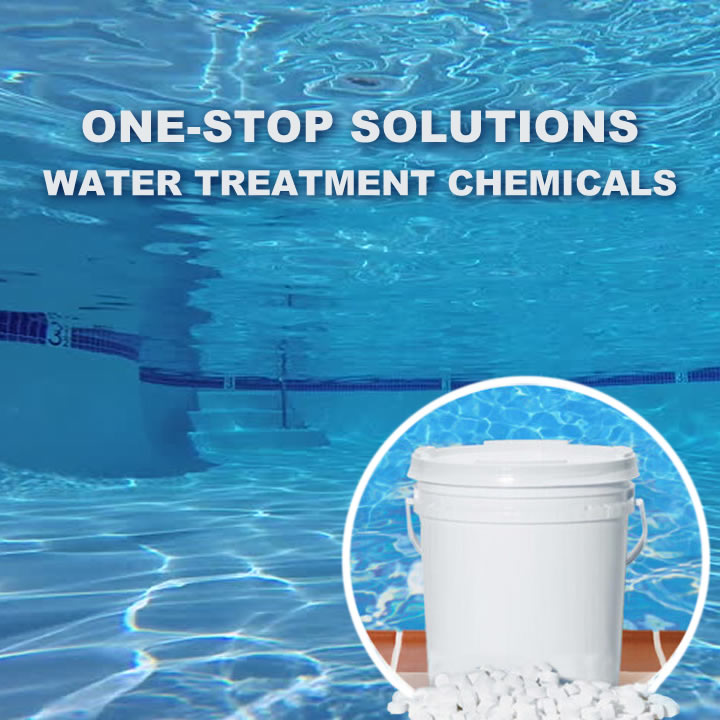Trichloroisocyanuric acid (TCCA) is an efficient, versatile reagent for chlorination and oxidation reactions. Its effectively used to synthesize various classes of compounds, including:
- Chlorinated arenes,
- N-chloramines and amides
- α‐halo‐carbonyl compounds
- Benzyl chlorides
- Esters
- Carboxylic anhydrides
It is commonly retailed in granules, tablets, or powder forms. Due to its high chlorine content, sterilization nature and bleaching efficiency its ideal for cleaning and disinfecting purposes. It kills fungi, bacteria as well as spores.
TCCA Properties
- Chemical name: Trichloroisocyanuric acid
- Formula: C303N3CI3
- CAS Number: 87-90-01
- Appearance: white powder, granules or tablets
- Effective chlorine: >90%
- PH (1% soln): 2.7 to 3.3
- Moisture: 0.5% max
Advantages Of Using TCCA
- An affordable yet stable source of chlorine.
- Has a long shelf life. Stable under storage.
- The sterilization lasts long.
- Zero white turbidity. Leaves your pool crystal clear.
- Easy to use and handle, including storage.
- Limited effects on you.
Use Cases
As stated earlier, this agent has high levels of chlorine. It, therefore, makes Trichloroisocyanuric acid (TCCA) have a wide range of usage. Ranging from disinfecting pool water, treatment and recycling of wastewater, and any water going to be used on the farm.
Other than that, here are other applications:
- Food Industry
Farmers and others working in the food industry use TCCA to disinfect fruits, vegetables, and meat. This kills the microbes living on the surface of the fruits.
Its long-lasting sterilization effect ensures that the product reaches the shelves in excellent condition but with reduced effects resulting from using the agent.
- Textile Industry
As you can see, TCCA is broadly used as a disinfectant. It’s used in the production of beautiful pieces of fabric in the textile sector. It’s also used in the anti-shrinking treatment of wool as well as inorganic chemical synthesis.
- Wastewater Treatment
TCCA is a superb source of chlorine to control any biofouling in cooling water systems and industrial water systems. It’s more economical and ecologically friendly compared to alternatives like bleach powder and sodium hypochlorite.
Hence, it’s an application in the treatment of wastewater treatment is highly effective.
- Swimming Pool Disinfection
For any pool owner, shopping for an effective means of cleansing his/her swimming pool. TCCA effectively kills all of the dangerous bacteria and viruses found in the water, making it safe to enjoy yourself. The agent has a limited effect on the human body while cleansing everything else.
- Printing/Dying
TCCA also finds use in the printing and dying sector, thanks to its elevated levels of chlorine. Here it is used as a bleaching agent of cotton, linen, wool, blended fibre, and synthetic fibres.
It has the added advantage of being superior to other bleaching agents- like sodium hypochlorite.
- Farming
When used in farming, TCCA has the added advantage of reducing instances of waterborne infectious diseases. Apart from animals, it helps to deal with plant-based diseases. They include bacterial wilt, root rot, verticillium, and bacterial wilt.
Aqua farmers have something to be happy about, as TCCA is highly useful in dealing with bacterial causing organisms in the ponds. Thanks to its potent anti-bacterial form, you can be more confident that no bacteria, viruses, or pests will make the pond their home.
And don’t worry, TCCA is pocket friendly and straightforward to use.
- Hospitals
TCCA, with its sterilization nature, is perfectly suited for adoption in hospitals. It can be used to sterilize both medical equipment as well as patients about to undergo surgery.
Handling Of TCCA
While dealing with TCCA, ensure to have your gloves on during the entire procedure. Extra caution needs to be taken to ensure that you do not inhale any of the dust particles. During reactions, TCCA releases large volumes of chlorine.
Observe the utmost safety while handling it. When not in use, store it in tightly sealed containers in a dark, well-ventilated room.
Since Trichloroisocyanuric acid gives off chlorine over time, it will be wise to separate it from other reagents and acids, kids and flammable materials.

